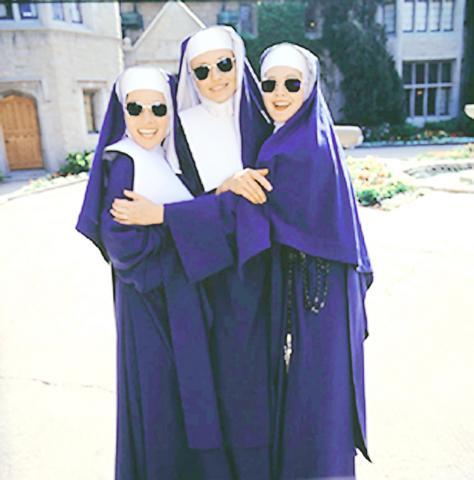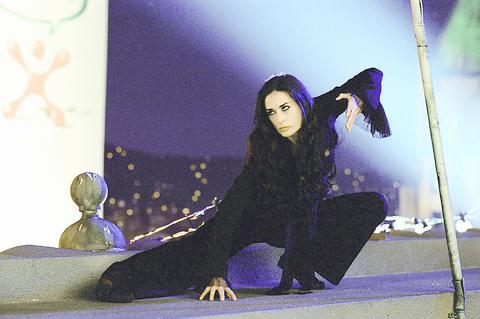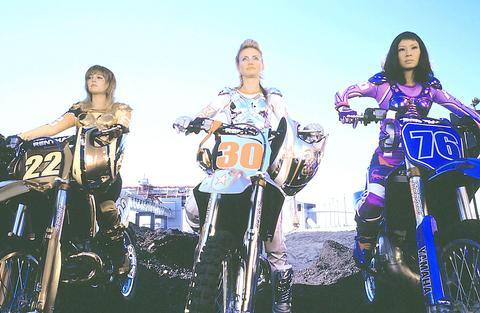Charlie's Angels: Full Throttle is like eating a bowl of Honeycomb drenched in Red Bull -- a dizzying mouthful of unabashed silliness that leads to an equally precipitous crash once the buzz wears off after the film's first hour. Still, it would be fair to say that the movie is better than both the television show that inspired it and its film predecessor. That's half a compliment at best.
Keep in mind that the high point of the series was Farrah Fawcett riding a skateboard away from some heavily sideburned thugs. Cameron Diaz, Drew Barrymore and Lucy Liu return as clumsy Natalie, boy-crazy Dylan and semi-prim Alex, bouncing girl adventurers, in a sequel whose sugar-rush absurdity almost defeats the forces of logic, taste and conventional narrative. It is a defect that might undermine a lesser movie but that in this case proves to be as cheerfully, enjoyably humid as the first blast of summer light and heat.
Angels is so much like a feature-length cartoon that you may find yourself sitting through the end credits waiting to see who provided the voices for the, if you'll pardon the expression, characters. The reward for your patience will be a music video with the Angels frolicking in wet and soapy slow motion, washing a Porsche as Anyway You Want It massages your temporal lobe.

PHOTOS COURTESY OF BVI
The director, McG, and the writers inform the picture with an abiding sweetness by treating the Angels like a family. The disembodied Charlie -- whose voice, as in the television show, is suavely provided by John Forsythe -- is still a Daddy Figure. The terrific trio is enlisted to retrieve a pair of purloined silver rings that blow the cover of everyone in the federal witness protection program, with predictable lethal results. But what carries more weight than any threat to law and order -- which the Angels can overcome with one hand tucked into thongs behind their backs -- is peril to the bonds that hold the three together.
In Angels there are three looming perils to Charlie's brood. One is Madison Lee (Demi Moore), the retired Angel-gone-renegade who is saddled with providing the traditional danger to the forces of good.
Another is Dylan's former lover, the Irish mob leader Seamus O'Grady (Justin Theroux), a color Xerox of Max Cady from Cape Fear -- complete with a tattoo covering his back and a score to settle. And perhaps the most insidious of all is Pete (Luke Wilson), who has just moved in with Natalie and may pop the question. Amusingly, the movie hasn't nerve enough to deal with what Pete's presence really intimates: jealousy, especially since the Angels seem as happy to tumble into one another's embrace as the Aaron Spelling stablemates Starsky and Hutch did.

PHOTOS COURTESY OF BVI
There is a more specific nonfamilial intrusion, the return of the silent but deadly Thin Man (Crispin Glover), who exploits Dylan's penchant for falling for the bad guy; this probably explains why she ended up with Tom Green in the first screen version of Angels. Family peeks in from another direction, too, as a new Bosley (the nubby-silk Bernie Mac) steps into the mix to replace his brother.
In one of the many nods to other movies, the Bosley clan is basically Steve Martin's family from The Jerk; it turns out that the original Bos, played by Bill Murray in the last film, was adopted by a black family. And in Angels, Mama Bosley takes in another orphaned white boy, Max (Shia LaBeouf).
Throttle seems to have so little confidence in the new Bosley that his subplot feels tacked on and condescending. The director isn't up to using Mac's acting talents as well as Steven Soderbergh did in Ocean's Eleven.

PHOTOS COURTESY OF BVI
The movie is so abundantly playful that when one of the characters, like Dylan, needs to register fear, her fright is too insubstantial to throw a shadow (though by now, if it hadn't been for her performance in Confessions of a Dangerous Mind, we'd have forgotten that Barrymore could even act). Obviously, the director chose not to take the high road of ratcheting up the intensity in making a movie inspired by a television, as with The Untouchables or The Fugitive. Rather, he went for the no-road approach: Angels was fired out of a cannon.
To that end, this sequel spends so much time keeping its stars airborne, suspended in kung-fu somersaults, back flips and throw-downs that appear to be a combination of Hong Kong action film and Herbal Essence commercial, that it seems to want you to believe they really are angels. The stunt performers get so much screen time they should be billed as co-stars.
The Angels motif is often rendered visually, too: the Angels, including Moore, are frequently given a shimmer that looks like a haloish backlight. The film is so thoroughly unapologetic about its riffing that the cameos (including the appearance of a totemic figure who, like Dylan, has a past) and the lively score (including updated versions of the Angels' theme and segue music) will make you smile as much as the Angels themselves.
There's something endearingly dopey about the picture's grown-up girl-power fantasies. The movie's conception of adulthood is to show that 40-ish Dark Angel, Madison, as being in such spectacular shape that she upstages the don't-dare-scratch-me red Ferrari she drives.
With such plot elements as a Justice Department official who has a private jet and a US marshal (Robert Patrick) who drives a Maserati Spyder, the movie feels cobbled together by a particularly well-heeled 13-year-old. The cars -- which include another, vintage Ferrari, a 1967 GTO and an Aston-Martin DB5 -- are as lovingly photographed as the actors. The movie seems as if it's partly underwritten by Forza magazine.
An extreme motocross chase-fight scene -- daredevil motorbikes on rough-and-tumble cross-country tracks -- which qualifies as Ben-Hur for the ESPN2 crowd, explains the "full throttle" part of the title. The smirky sexuality and what passes for innuendo, with the Angels offering fully clothed lap dances while backed by the dance troupe Pussycat Dolls, is more of a tease than a ninth-grade first date.
In addition to lifts from The Jerk and Face-Off -- Madison keeps a pair of gold-plated automatics tucked in a holster behind her back like Nicolas Cage -- the movie rams home so many pop-culture quotes and cameos that it functions as a time capsule, an artifact grab that will probably be taught in American culture classes at Yale.
Angels is a novelty of sorts: the first mass-market phenomenon that wouldn't cast a reflection if posed before a mirror. And that makes sense. There's something slightly vampiric about the way the movie drains the life fluids of everything that has come before it.
By the time the sugar rush of the first hour wears off, the movie falls back on a VH1 classic score to keep its twitching fingers from falling asleep. (The film's exhaustive shallowness is so apparent that the Edwyn Collins hit A Girl Like You almost registers as symbolism.) Charlie's Angels: Full Throttle is like digging through the world's grooviest thrift store treasures; even rummaging pirates won't care if the booty is on duty.

June 9 to June 15 A photo of two men riding trendy high-wheel Penny-Farthing bicycles past a Qing Dynasty gate aptly captures the essence of Taipei in 1897 — a newly colonized city on the cusp of great change. The Japanese began making significant modifications to the cityscape in 1899, tearing down Qing-era structures, widening boulevards and installing Western-style infrastructure and buildings. The photographer, Minosuke Imamura, only spent a year in Taiwan as a cartographer for the governor-general’s office, but he left behind a treasure trove of 130 images showing life at the onset of Japanese rule, spanning July 1897 to

One of the most important gripes that Taiwanese have about the Democratic Progressive Party (DPP) is that it has failed to deliver concretely on higher wages, housing prices and other bread-and-butter issues. The parallel complaint is that the DPP cares only about glamor issues, such as removing markers of Chinese Nationalist Party (KMT) colonialism by renaming them, or what the KMT codes as “de-Sinification.” Once again, as a critical election looms, the DPP is presenting evidence for that charge. The KMT was quick to jump on the recent proposal of the Ministry of the Interior (MOI) to rename roads that symbolize

On the evening of June 1, Control Yuan Secretary-General Lee Chun-yi (李俊俋) apologized and resigned in disgrace. His crime was instructing his driver to use a Control Yuan vehicle to transport his dog to a pet grooming salon. The Control Yuan is the government branch that investigates, audits and impeaches government officials for, among other things, misuse of government funds, so his misuse of a government vehicle was highly inappropriate. If this story were told to anyone living in the golden era of swaggering gangsters, flashy nouveau riche businessmen, and corrupt “black gold” politics of the 1980s and 1990s, they would have laughed.

In an interview posted online by United Daily News (UDN) on May 26, current Chinese Nationalist Party (KMT) Chairman Eric Chu (朱立倫) was asked about Taichung Mayor Lu Shiow-yen (盧秀燕) replacing him as party chair. Though not yet officially running, by the customs of Taiwan politics, Lu has been signalling she is both running for party chair and to be the party’s 2028 presidential candidate. She told an international media outlet that she was considering a run. She also gave a speech in Keelung on national priorities and foreign affairs. For details, see the May 23 edition of this column,